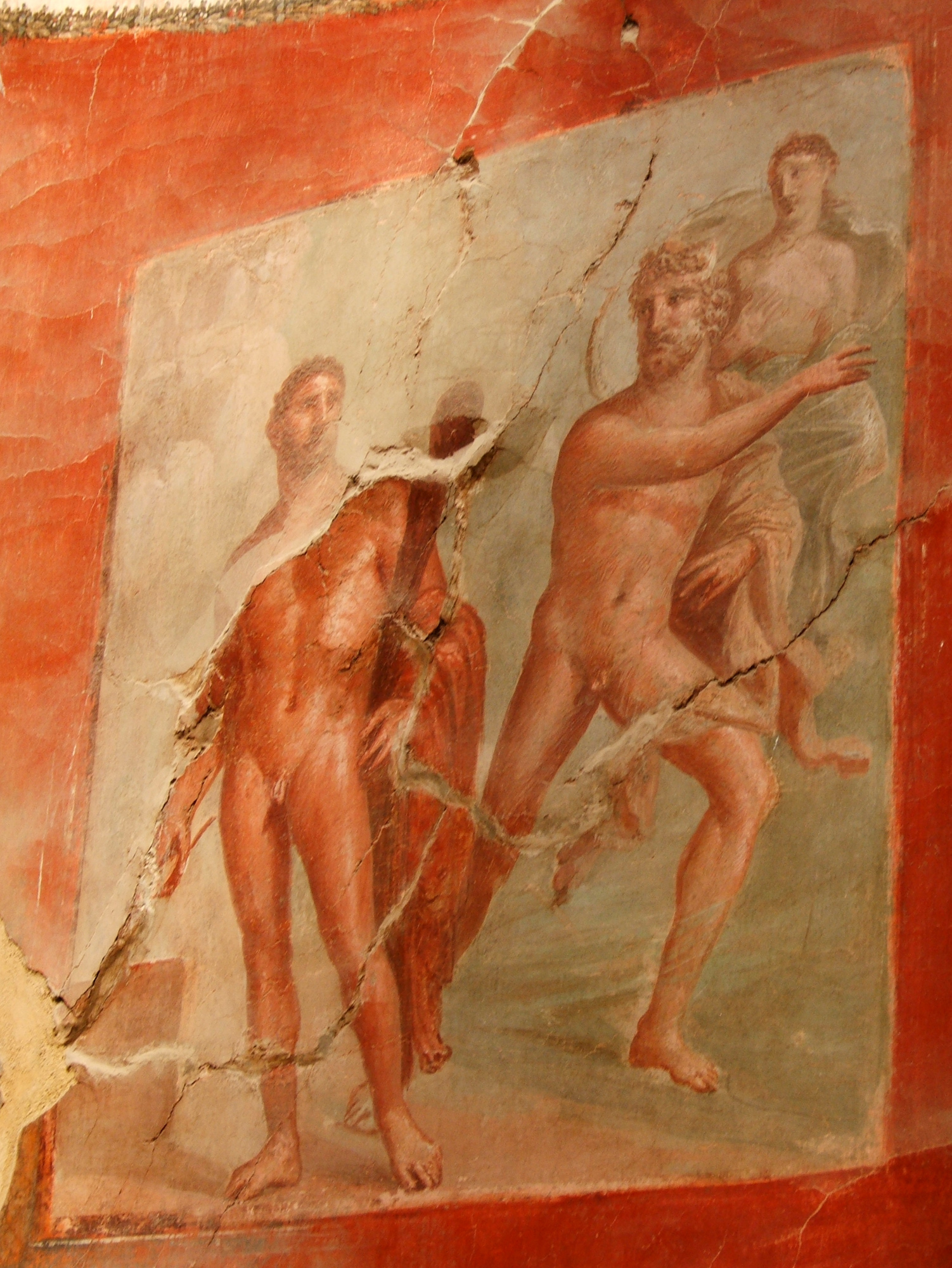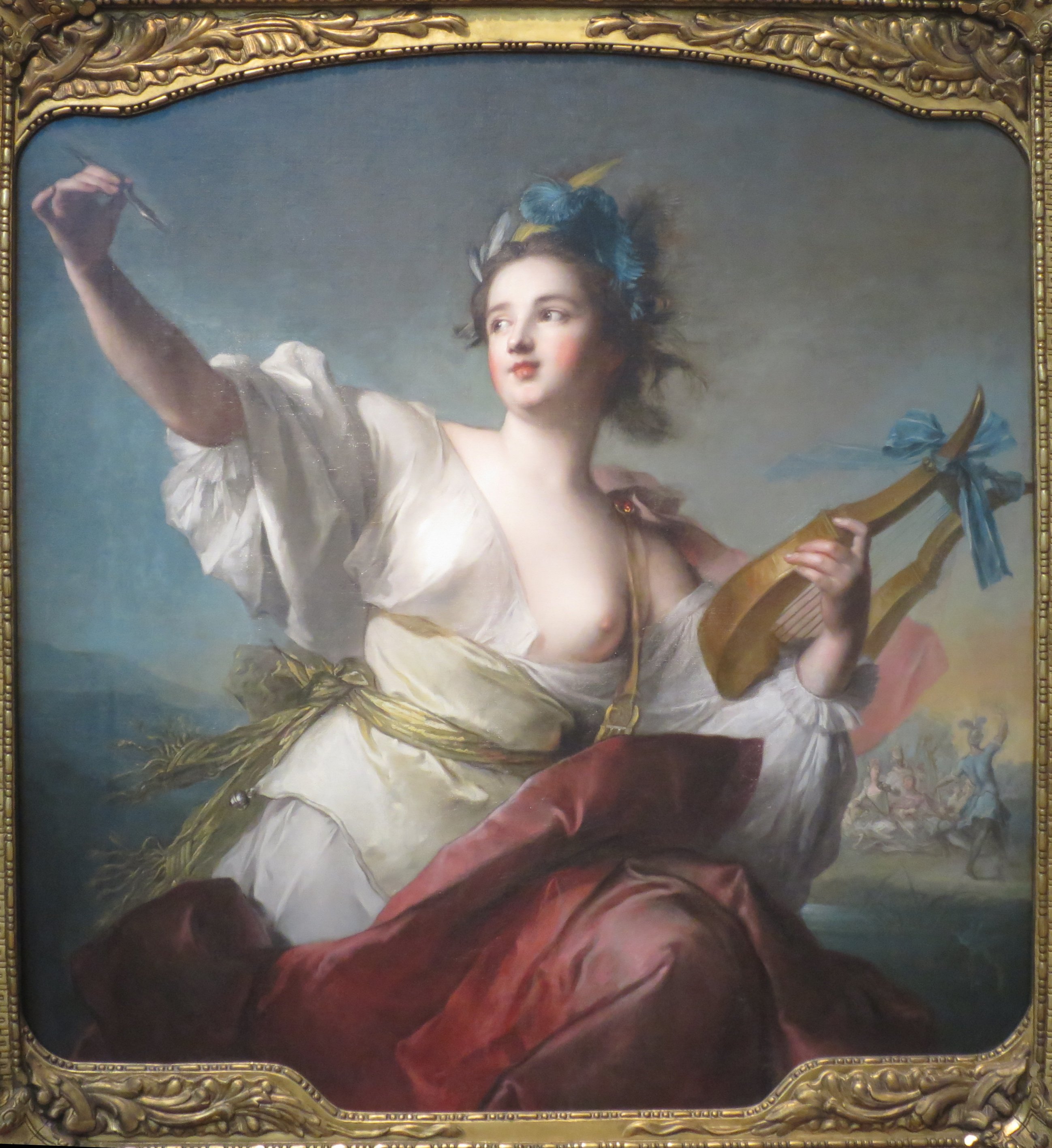|
Melpomene
Melpomene (; ) is the Muse of tragedy in Greek mythology. She is described as the daughter of Zeus and Mnemosyne (and therefore of power and memory) along with the other Muses, and she is often portrayed with a tragic theatrical mask. Etymology Melpomene's name (implying the meaning "Songstress") is derived by etymologists from the Ancient Greek verb (''melpô'') or from its inflexion μέλπομαι (''melpomai'') meaning "to celebrate with dance and song". The Oxford English Dictionary cites μέλπειν (''melpein'' – to sing). Myth Melpomene is one of the nine Muses, the Muse of tragedy. Hesiod, Pseudo-Apollodorus, Apollodorus, and Diodorus Siculus all held that Melpomene was the daughter of Zeus and Mnemosyne. She was the sister of the other Muses, Calliope, Clio, Erato, Euterpe, Polyhymnia, Terpsichore, Thalia (Muse), Thalia, and Urania. Apollodorus, Lycophron, and Gaius Julius Hyginus said that Melpomene was the mother of the Siren (mythology), sirens, though so ... [...More Info...] [...Related Items...] OR: [Wikipedia] [Google] [Baidu] |
Muse
In ancient Greek religion and Greek mythology, mythology, the Muses (, ) were the Artistic inspiration, inspirational goddesses of literature, science, and the arts. They were considered the source of the knowledge embodied in the poetry, lyric poetry, lyric songs, and myths that were related orally for centuries in ancient Greek culture. The number and names of the Muses differed by region, but from the Classical Greece, Classical period the number of Muses was standardized to nine, and their names were generally given as Calliope, Clio, Polyhymnia, Euterpe, Terpsichore, Erato, Melpomene, Thalia (Muse), Thalia, and Urania. In modern figurative usage, a muse is a Muse (source of inspiration), person who serves as someone's source of artistic inspiration. Etymology The word ''Muses'' () perhaps came from the Indo-European ablaut#Proto-Indo-European, o-grade of the Proto-Indo-European language, Proto-Indo-European root (the basic meaning of which is 'put in mind' in verb formati ... [...More Info...] [...Related Items...] OR: [Wikipedia] [Google] [Baidu] |
Comedy And Tragedy Masks
The comedy and tragedy masks, also known as the drama masks, are a pair of masks, one crying and one laughing, that have widely come to represent the performing arts. Originating in the theatre of ancient Greece, the masks were said to help audience members far from the stage to understand what emotions the characters were feeling. The crying mask is often ascribed the name Melpomene, after the Muse of tragedy, sometimes abbreviated as ''Melpo'', while the laughing mask is named for Thalia, the Muse of comedy, with the Muses often depicted holding their respective masks. Melpomene and Thalia were daughters of Zeus. ''Melpomene'' means a celebration of dance and song, while ''Thalia'' comes from the Greek ''thallein'' meaning to flourish or be verdant. They are often depicted wearing the sock and buskin, which have also come to represent comedy and tragedy, and the masks are thus sometimes referred to as Sock and Buskin. The masks have also sometimes been associated with the Gre ... [...More Info...] [...Related Items...] OR: [Wikipedia] [Google] [Baidu] |
Siren (mythology)
In Greek mythology, sirens () are female humanlike beings with alluring voices; they appear in a scene in the ''Odyssey'' in which Odysseus saves his crew's lives. Roman poets place them on some small islands called Sirenum scopuli. In some later, rationalized traditions, the literal geography of the "flowery" island of Anthemoessa, or Anthemusa, is fixed: sometimes on Cape Pelorum and at others in the islands known as the Sirenuse, near Paestum, or in Capreae. All such locations were surrounded by cliffs and rocks. Sirens continued to be used as a symbol of the dangerous temptation embodied by women regularly throughout Christian art of the medieval era. "Siren" can also be used as a slang term for a woman considered both very attractive and dangerous. Nomenclature The etymology of the name is contested. Robert S. P. Beekes has suggested a Pre-Greek origin. Others connect the name to σειρά (''seirá'', "rope, cord") and εἴρω (''eírō'', "to tie, join, faste ... [...More Info...] [...Related Items...] OR: [Wikipedia] [Google] [Baidu] |
Zeus
Zeus (, ) is the chief deity of the List of Greek deities, Greek pantheon. He is a sky father, sky and thunder god in ancient Greek religion and Greek mythology, mythology, who rules as king of the gods on Mount Olympus. Zeus is the child of Cronus and Rhea (mythology), Rhea, the youngest of his siblings to be born, though sometimes reckoned the eldest as the others required disgorging from Cronus's stomach. In most traditions, he is married to Hera, by whom he is usually said to have fathered Ares, Eileithyia, Hebe (mythology), Hebe, and Hephaestus.Hard 2004p. 79 At the oracle of Dodona, his consort was said to be Dione (Titaness/Oceanid), Dione, by whom the ''Iliad'' states that he fathered Aphrodite. According to the ''Theogony'', Zeus's first wife was Metis (mythology), Metis, by whom he had Athena.Hesiod, ''Theogony'886900 Zeus was also infamous for his erotic escapades. These resulted in many divine and heroic offspring, including Apollo, Artemis, Hermes, Persephone, D ... [...More Info...] [...Related Items...] OR: [Wikipedia] [Google] [Baidu] |
Mnemosyne
In Greek mythology and ancient Greek religion, Mnemosyne (; , ) is the goddess of memory and the mother of the nine Muses by her nephew Zeus. In the Greek tradition, Mnemosyne is one of the Titans, the twelve divine children of the earth-goddess Gaia and the sky-god Uranus. The term ''Mnemosyne'' is derived from the same source as the word ''mnemonic'', that being the Greek word ''mnēmē'', which means "remembrance, memory". Family A Titaness, Mnemosyne is the daughter of Uranus and Gaia. Mnemosyne became the mother of the nine Muses, fathered by her nephew, Zeus: * Calliope (epic poetry) * Clio (history) * Euterpe (music and lyric poetry) * Erato (love poetry) * Melpomene (tragedy) * Polyhymnia (hymns) * Terpsichore (dance) * Thalia (comedy) * Urania (astronomy) Hyginus in his ''Fabulae'' gives Mnemosyne a different parentage, where she was the daughter of Zeus and Clymene. Mythology In Hesiod's ''Theogony'', kings and poets receive their powers of authori ... [...More Info...] [...Related Items...] OR: [Wikipedia] [Google] [Baidu] |
Euterpe
Euterpe (; , from + ) was one of the Muses in Greek mythology, presiding over music. In late Classical times, she was named muse of lyric poetry. She has been called "Giver of delight" by ancient poets. Mythology Euterpe was born as one of the daughters of Mnemosyne, Titan goddess of memory, and fathered by Zeus, god of the gods. Her sisters include Calliope (muse of epic poetry), Clio (muse of history), Melpomene (muse of tragedy), Terpsichore (muse of dancing), Erato (muse of erotic poetry), Thalia (muse of comedy), Polyhymnia (muse of hymns), and Urania (muse of astronomy). Sometimes they are referred to as water nymphs having been born from the four sacred springs on Helicon which flowed from the ground after Pegasus, the winged horse, stamped his hooves on the ground. The mountain spring Cassotis on Mount Parnassus was sacred to Euterpe and the other Muses. It flowed between two high rocks above the city of Delphi, and in ancient times its sacred waters were retain ... [...More Info...] [...Related Items...] OR: [Wikipedia] [Google] [Baidu] |
Erato
In Greek mythology, Erato (; ) is one of the Greek Muses, the inspirational goddesses of literature, science, and the arts. The name would mean "desired" or "lovely", if derived from the same root as Eros, as Apollonius of Rhodes playfully suggested in the invocation to Erato that begins Book III of his ''Argonautica''. Function Erato is the Muse of lyric poetry, particularly erotic poetry, and mimic imitation. In the Orphism (religion), Orphic hymn to the Muses, it is Erato who charms the sight. Since the Renaissance she has mostly been shown with a wreath of Myrtus communis, myrtle and roses, holding a lyre, or a small kithara, a musical instrument often associated with Apollo. In Simon Vouet's representations, two turtle-doves are eating seeds at her feet. She is sometimes depicted holding a golden arrow, symbolizing "eros", the feeling she inspires in everybody; at times she is accompanied by Eros, holding a torch. Family In Family tree of the Greek gods, Hesiod's geneal ... [...More Info...] [...Related Items...] OR: [Wikipedia] [Google] [Baidu] |
Achelous
In ancient Greek religion and Greek mythology, mythology, Achelous (also Acheloos or Acheloios) (; Ancient Greek: Ἀχελώϊος, and later , ''Akhelôios'') was the god associated with the Achelous River, the largest river in Greece. According to Hesiod, he was the son of the Titans Oceanus and Tethys (mythology), Tethys. He was also said to be the father of the Siren (mythology), Sirens, several nymphs, and other offspring. Achelous was able to change his shape, and in the form of a bull, he wrestled Heracles for the right to marry Deianeira, but lost. He was also involved in the legend of the Argos, Peloponnese, Argive hero Alcmaeon (mythology), Alcmaeon. Etymology The name Ἀχελώϊος is possibly pre-Greek, its meaning is not entirely certain. Recent arguments suggest it is Semitic languages, Semitic in origin, with the initial Αχ- stemming from the Akkadian (language), Akkadian ''aḫu'' ("bank of the river"), or ''aḫû'' ("seashore") and the suffix -ελώἴ� ... [...More Info...] [...Related Items...] OR: [Wikipedia] [Google] [Baidu] |
Terpsichore
In Greek mythology, Terpsichore (; , "delight in dancing") is one of the nine Muses and goddess of dance and chorus. She lends her name to the word " terpsichorean", which means "of or relating to dance". Appearance Terpsichore is usually depicted sitting down, holding a lyre, accompanying the dancers' choirs with her music. Her name comes from the Greek words τέρπω ("delight") and χoρός ("dance"). Family According to Hesiod's ''Theogony'', Zeus lay with the Titan Mnemosyne each night for nine nights in Piera, producing the nine Muses. According to Apollonius of Rhodes, Terpsichore was the mother of the Sirens by the river god Achelous. The '' Etymologicum Magnum'' mentions her as the mother of the Thracian king Biston by Ares. According to the Byzantine scholar Eustathius, Terpsichore was the mother of the Thracian king Rhesus by the river god Strymon. Eustathius on Homer, ''Iliad'' p. 817. In culture Historical * The British 32-gun frigate commanded b ... [...More Info...] [...Related Items...] OR: [Wikipedia] [Google] [Baidu] |




